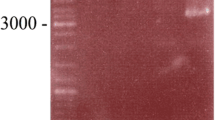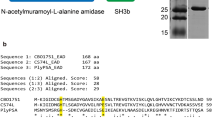Abstract
The presence of 0.5–1.0 mM zinc (Zn) in a complex sporulation medium stimulated spore formation in certain strains ofClostridium botulinum. Zinc increased both the titer of free refractile spores (spores per liter) and the percentage conversion of vegetative cells to spores. Certain other transition metals including iron (Fe) and manganese (Mn) also improved sporulation, but not so effectively as zinc. Sporulation was drastically decreased by the addition to the medium of 0.5–1.0 mM copper (Cu). Copper was shown to compete with the acquisition of zinc by the sporulating cells. Spores were separated from their progenitor vegetative cells to ≥98% homogeneity by incorporation of a density-separation step in the extensive washing procedure. Analysis of the metal contents of the purified spores showed that zinc levels in spores were reduced considerably in culture media containing excess copper. The results imply that either the availability of zinc or the limitation of copper stimulates sporulation inC. botulinum. In addition toC. botulinum 113B, zinc also increased sporulation in several type A, B, and E strains and one proteolytic type F strain ofC. botulinum.
Similar content being viewed by others
Literature Cited
Amaha M, Ordal ZJ (1957) Effect of divalent cations in the sporulation medium on the thermal death rate ofBacillus coagulans var. thermoacidurans. J Bacteriol 89:984–987
Amaha M, Ordal ZJ, Touba A (1956) Sporulation requirements ofBacillus coagulans varthermoacidurans in complex media. J Bacteriol 72:34–41
Aoki H, Slepecky RA (1973) Inducement of a heat-shock requirement for germination and production of increased heat resistance inBacillus fastidiosus spores by manganese ions. J Bacteriol 114:137–143
Charney J, Fisher WP, Hegarty CP (1951) Manganese as an essential element for sporulation in the genusBacillus. J Bacteriol 62:145–148
Day LE, Costilow RN (1964) Physiology of the sporulation process inClostridium botulinum. II. Maturation of forespores. J Bacteriol 88:695–701
Failla ML (1977) Zinc: functions and transport in microorganisms. In: Weinberg ED (ed) Microorganisms and minerals. New York: Marcel Dekker, Inc., pp 151–214
Freese E, Heinze J (1984) Metabolic and genetic control of sporulation. In: Hurst A, Gould GW (eds) The bacterial spore, vol 2. London: Academic Press, pp 101–172
Kolodziej BJ, Slepecky RA (1964) Trace metal requirements for sporulation ofBacillus megaterium. J Bacteriol 88:821–830
Lundgren DG, Beskid G (1960) Isolation and investigation of induced asporogenic mutants. Can J Microbiol 6:135–151
Lundgren DG, Cooney JJ (1962) Chemical analysis of asporogenic mutants ofBacillus cereus. J Bacteriol 83:1287–1293
Murrell WG (1967) Biochemistry of the bacterial endospore. In: Rose AH, Wilkinson JF (eds) Advances in microbial physiology, vol 1. New York: Academic Press, pp 133–251
Ochizi EI (1978) The evolution of the environment and its influence on the evolution of life. Origins of Life 9:81–91
Osterberg R (1974) Origins of metal ions in biology. Nature 249:382–383
Perkins WE, Tsuji K (1962) Sporulation ofClostridium botulinum II. Effect of arginine and its degradation products on sporulation in a synthetic medium. J Bacteriol 84:86–94.
Schantz EJ (1964) Purification and characterization ofC. botulinum toxins. In: Lewis KH, Cassel K Jr (eds) Botulism. Cincinnati, Ohio: Cincinnati Public Health Service, US Department of Health, Education and Welfare
Slepecky RA, Leadbetter ER (1984) On the prevalence and roles of sporeforming bacteria and their spores in nature. In: Hurst A, Gould GW (eds) The bacterial spore, vol. 2. London: Academic Press, pp 79–99
Vitner V (1969) Physiology and biochemistry of sporulation. In: Gould GW, Hurst A (eds) The bacterial spore. New York: Academic Press, pp 73–123
Weinberg ED (1955) The effect of Mn2+ and antimicrobial drugs on sporulation ofBacillus subtilis in nutrient broth. J Bacteriol 70:289–296
Whitmer ME, Johnson E (1988) Development of improved defined media forClostridium botulinum serotypes A, B, and E. Appl Microbiol, in press
Author information
Authors and Affiliations
Rights and permissions
About this article
Cite this article
Kihm, D.J., Hutton, M.T., Hanlin, J.H. et al. Zinc stimulates sporulation inClostridium botulinum 113B. Current Microbiology 17, 193–198 (1988). https://doi.org/10.1007/BF01589451
Issue Date:
DOI: https://doi.org/10.1007/BF01589451




